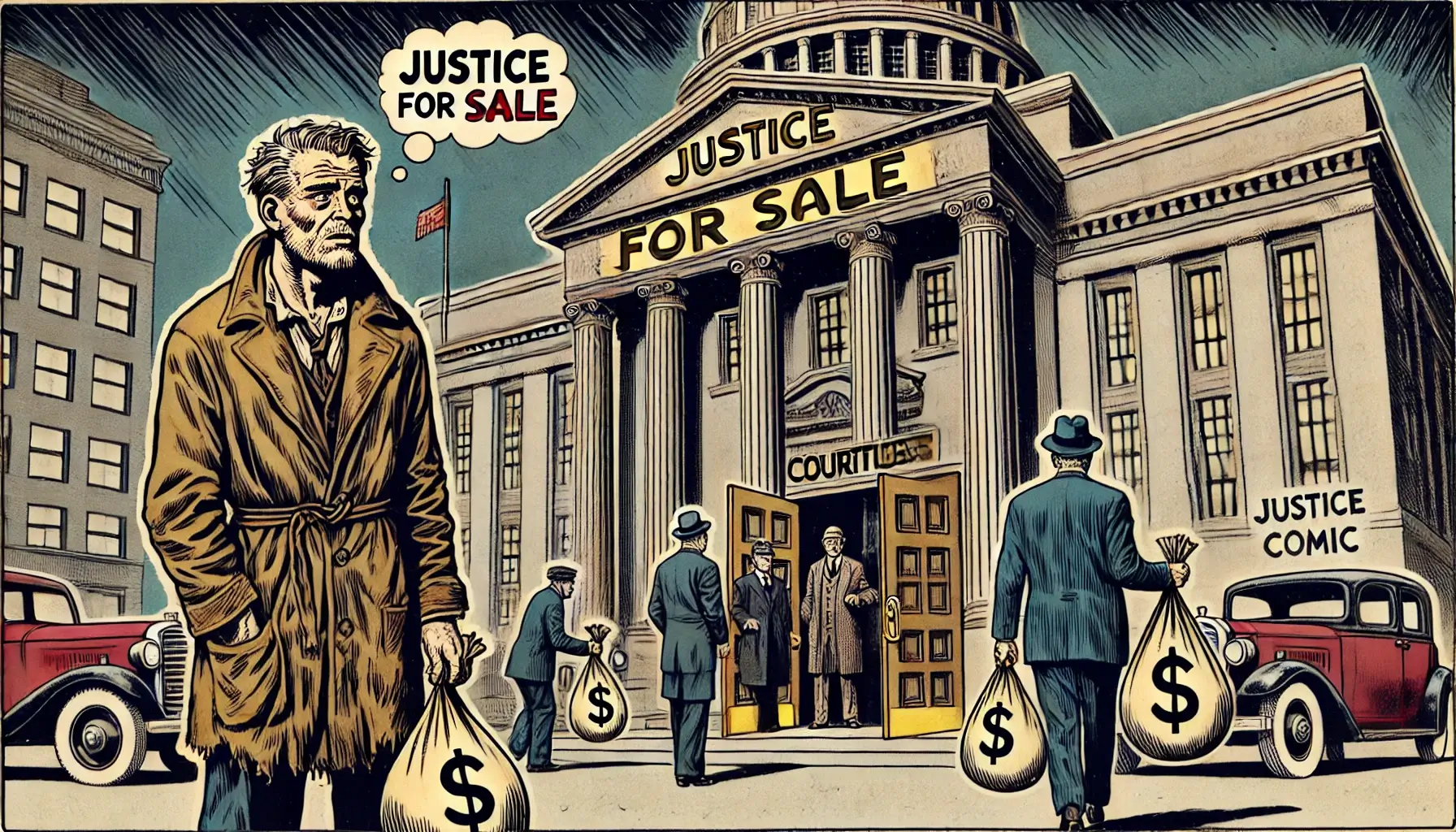American Courts Are Structurally Unconstitutional

Unspoken Barriers to Justice
In America, we talk about freedom, equality, and rights, but what if you can’t afford to enforce your rights, they are abstractions not realities. Part of what it takes to afford yourself the opportunity to enforce your rights has to do with the willingness. Some people are afraid, or believe it is better to simply not enforce their rights. The other material challenge has to do with financially being capable of enforcing their rights.
If you are illegally evicted, defrauded by a corporation, or targeted by government overreach, you technically have legal recourse – but only if you can pay thousands of dollars for an attorney or navigate an intentionally opaque legal system. Though some non-profit organizations may provide certain people support through this, it is not commonplace, and that still demonstrates that it is not a fundamental civil right.
Even worse, in certain courts, such as Philadelphia’s Business Court, you are legally forbidden from representing yourself – which means poor and independent litigants are completely locked out of justice. I know this personally, and many find it hard to believe. But then again, most people do not believe they could produce a legal argument capable of convincing a judge. Many people are unaware of pro se rights.
Now, the government is going further, making it even harder to sue them. Trump recently signed an executive order allowing the federal government to collect legal fees from people who lose lawsuits against it. This means that if you challenge an unconstitutional law, and lose, you could end up paying the government for the privilege of trying.
This is not just immoral – it’s unconstitutional. The legal system structurally violates the 1st, 8th, and 14th Amendments, stripping Americans of their ability to seek justice.
This must be challenged as bad policy, and an attack on constitutional rights.
1st Amendment Violation: The Right to Petition the Government for Redress of Grievances
The First Amendment guarantees your right to petition the government for redress of grievances – meaning if the government wrongs you, you have the right to challenge it.
These days that has been corrupted, converted to cause people to believe that it means they have a right to complain on social media. You might even think of this as a right to protest in the street. Many believe that running for office is the best way to affect a change in government or society. Lawsuits also shape things.
Yet, the government has created barriers that make exercising this right nearly impossible for anyone without financial resources:
- Mandatory Attorney Laws: Certain courts do not allow pro se plaintiffs, meaning you must hire a lawyer just to access the court system.
- High Filing Fees & Court Costs: Justice is not free, and for many, it’s not even affordable.
- Trump’s Executive Order Weaponizing Fees: If you lose against the government, you could owe them legal fees, making it financially dangerous to sue for your rights.
These restrictions do not outright ban lawsuits, but they effectively do so for anyone who lacks money.
This is de facto censorship – denying poor and independent plaintiffs the ability to use the courts to hold power accountable.
If the government can violate your rights, then make it financially impossible for you to fight back, the right to petition is meaningless.
8th Amendment Violation: Denial of Justice as Cruel & Unusual Punishment
The Eighth Amendment prohibits cruel and unusual punishment, which courts have interpreted to mean punishments that are extreme, excessive, or disproportionate.
Denying access to legal recourse is a form of cruel punishment. Here’s why:
- If you cannot sue, you are left with no legal remedy – meaning you remain trapped in financial, personal, or social ruin caused by an injustice.
- Powerful people and institutions can act with impunity – knowing their victims cannot afford to fight back.
- This leads to extralegal retribution, escalating conflict, and social breakdown – as those without legal access may feel forced to take matters into their own hands.
A legal system that selectively denies justice based on class is inherently unjust. The denial of legal access disproportionately punishes those who cannot afford representation – a punishment that is both cruel and unusual.
14th Amendment Violation: Unequal Protection Under the Law
The Fourteenth Amendment guarantees equal protection under the law, yet the American legal system is structured to favor those with financial means.
How the Courts Violate the 14th Amendment:
- You cannot access certain courts without a lawyer – making legal rights dependent on income.
- Wealthy individuals, corporations, and the government use financial barriers to crush lawsuits – forcing opponents to abandon legal action.
- Trump’s Executive Order makes losing a lawsuit against the government financially devastating – effectively scaring people out of challenging government overreach.
The Fourteenth Amendment does not say that only the rich deserve justice. Yet, the way the legal system functions creates a two-tier system where the wealthy have full legal protection, and the poor have no legal recourse.
This directly contradicts the guarantee of equal protection under the law.
Frivolous Lawsuits Are Already A Problem
One common criticism of expanding legal access is that it would lead to frivolous lawsuits. This is a false narrative. The most frivolous lawsuits in America do not come from ordinary people seeking justice – they come from wealthy individuals, corporations, and political actors abusing the courts as a weapon.
If justice were truly blind, the system would not reward those who abuse it financially while punishing those who seek justice. The real problem isn’t too many lawsuits – it’s that too few people have access to them.
Free Plaintiffs & Public Offenders
If America truly believed in equal justice under the law, it would guarantee:
- The Right to Self-Representation in All Courts
- A “Free Plaintiff” System For Civilian Access To Any Legal Representation
- Public Offenders to Prevent Civil Escalation
Without a meaningful way to resolve grievances, many disputes escalate into crime, because there is no accessible legal alternative.
This is not just a legal issue – it’s a fundamental issue of democracy.
Legal Access Is a Civil Right
America has never recognized the right to legal recourse as a fundamental civil right.
But without it, all other rights can be rendered meaningless.
- If you can’t sue, your property can be stolen.
- Without court access, your rights can be permanently violated.
- Without these rights, corruption is commonplace.
The 1st, 8th, and 14th Amendments are violated every day by a legal system that makes justice conditional on wealth.
This is not just unfair – it’s unconstitutional.
If we do not fix this, then justice in America will always be a privilege, never a right.
Legal access is the civil rights battle of our time.
